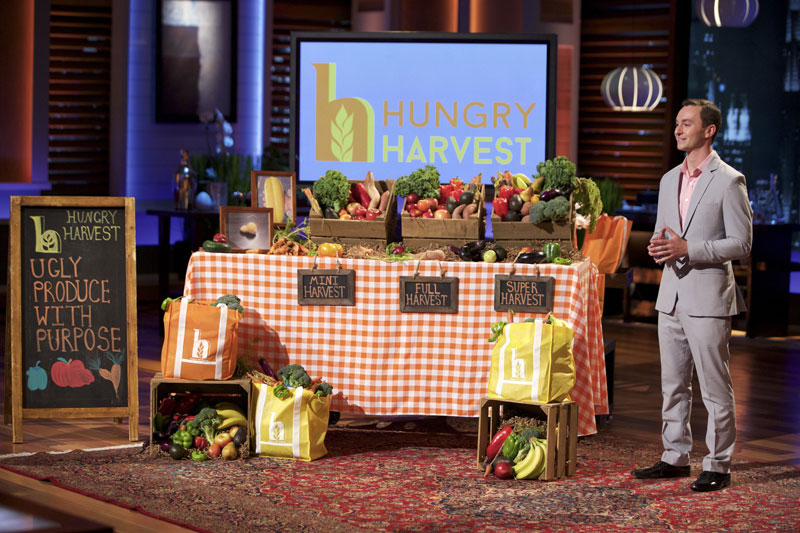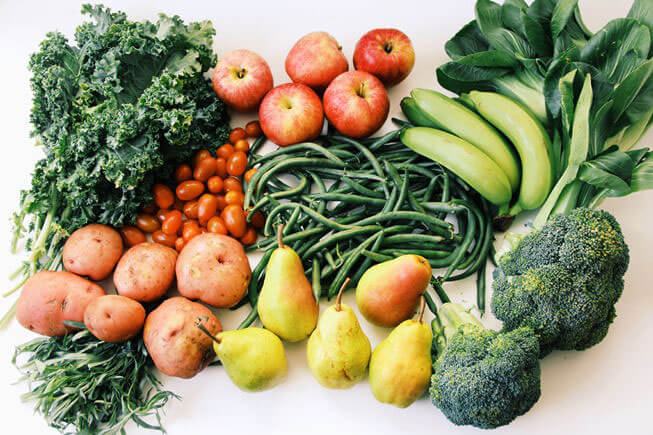This Maryland Guy is Making Money on Food Waste, While Also Feeding the Hungry
One farmer’s compost pile is another man’s cash cow.
Some of the food is just “extra” – farmers don’t always have a buyer for every piece of produce they grow – and some of it’s just “ugly,” says Evan Lutz, 23, who has been cashing in on the deformed and rejected produce of his home state of Maryland since 2014.
“We sell ugly fruit,” says Lutz, beaming like a used car salesman, in the first five seconds of a promotional video for his company, Hungry Harvest. Lutz has a quirky sense of humor about his work, which lends a fun, wholesome, and adventurous vibe to the idea of paying him for food that would otherwise be thrown away. “I’ve always been ugly, and as a kid I faced a lot of discrimination even though I knew I was beautiful inside,” he continues, tongue-in-cheek, in the video. “That’s the same thing that’s happening to all the fruit out there. I want to make sure that people know that ugly fruit is also beautiful inside.”
Business is booming. Lutz and his crew deliver bags of produce to the doorsteps of 2,300 customers each week – a CSA of “seconds,” so to speak. He says they buy the food for “pennies on the dollar” from area farmers, packing houses and wholesalers, and then turn around and sell it for $15 for a one- to two-person bag, on up to $35 for a bag that will feed a family of four to seven people. Bags of certified organic produce range from $30 to $55.
Hungry Harvest’s promotional video landed them a spot on the reality TV show Shark Tank, where contestants compete for a capital investment in their business from a jury of self-made millionaires and billionaires. The company won a $100,000 investment on the show in January, which they’re using to expand from their home base in Baltimore to DC, Philly, Pittsburgh and New York.
But Lutz is not just about pilfering dumpsters for profit – Hungry Harvest has a serious social mission as well. The flipside of the food waste epidemic in America is the 50 million or so Americans who are “food insecure,” he says, plenty of whom live in Baltimore. For every bag of produce Hungry Harvest sells, they donate two pounds of produce to local organizations that feed hungry people. Lutz estimates that they’ve “recovered” 300,000 pounds of food so far and donated 100,000 pounds to people in need.
“The modern non-profit is a for-profit social enterprise,” says Lutz, who cooked up the Hungry Harvest model during his senior year of business school at the University of Maryland. “There is nothing wrong with making money – and we want to make a lot of it, don’t get me wrong – but we want to do it in the right way. I think the most effective way to eliminate food waste and food deserts around the US is with a for-profit sustainable business model.”

Beyond feeding the homeless and other food insecure individuals, the weekly deliveries to paying customers are priced for families on a budget, at approximately 30 percent below average retail prices, helping to make fresh food more accessible. Plus, delivery is free, which is a boon for those who can’t afford a car.
And lest you imagine the low-income recipients of Hungry Harvest food munching on half-rotten apples, Lutz is quick to point out that Hungry Harvest produce is often fresher than supermarket produce simply because it hasn’t been sitting on grocery-store shelves and hasn’t passed through the hands of as many middlemen. What sort of produce should customers expect to receive in their weekly bag? Typical examples include eggplant with strange protuberances, undersize apples, or bell peppers that came out of the field in a mix of colors, rather than the standard green, red, yellow, or orange – nothing that detracts from flavor, just little imperfections that (depending on your point of view) add character.
Produce is gleaned from a network of 100-plus farmers, processors, and distributors, though only a handful of those have suitable produce to offer in a given week. The logistics are complex, which is why Hungry Harvest is developing an app to make it easy for a farmer to notify the company of anything they have to sell and arrange for pick-up. “The nature of surplus produce is you don’t really know how much you’re going to have on a weekly basis,” says Lutz. “The app will be really simple: You just take a picture of the produce on your phone, give us the price, the quantity, the variety, and the quality, and then we will work out logistics.”
With an infusion of capital from their Shark Tank war chest, the company is rapidly expanding. They’re developing a value-added product line, starting with pesto made from “recovered” basil and bread from a local bakery that donates one loaf to charity for every two sold. Eventually they hope to establish franchises throughout the country. Right now there are just four full-time employees, though Lutz hopes to double the crew in the next few months. They’re also looking for more food waste sources, says Lutz, shamelessly looking for a free PSA, “so if you’re a farmer or a wholesaler interested in selling surplus, shoot us an email.”
Follow us

This work is licensed under a Creative Commons Attribution-NoDerivatives 4.0 International License.
Want to republish a Modern Farmer story?
We are happy for Modern Farmer stories to be shared, and encourage you to republish our articles for your audience. When doing so, we ask that you follow these guidelines:
Please credit us and our writers
For the author byline, please use “Author Name, Modern Farmer.” At the top of our stories, if on the web, please include this text and link: “This story was originally published by Modern Farmer.”
Please make sure to include a link back to either our home page or the article URL.
At the bottom of the story, please include the following text:
“Modern Farmer is a nonprofit initiative dedicated to raising awareness and catalyzing action at the intersection of food, agriculture, and society. Read more at <link>Modern Farmer</link>.”
Use our widget
We’d like to be able to track our stories, so we ask that if you republish our content, you do so using our widget (located on the left hand side of the article). The HTML code has a built-in tracker that tells us the data and domain where the story was published, as well as view counts.
Check the image requirements
It’s your responsibility to confirm you're licensed to republish images in our articles. Some images, such as those from commercial providers, don't allow their images to be republished without permission or payment. Copyright terms are generally listed in the image caption and attribution. You are welcome to omit our images or substitute with your own. Charts and interactive graphics follow the same rules.
Don’t change too much. Or, ask us first.
Articles must be republished in their entirety. It’s okay to change references to time (“today” to “yesterday”) or location (“Iowa City, IA” to “here”). But please keep everything else the same.
If you feel strongly that a more material edit needs to be made, get in touch with us at [email protected]. We’re happy to discuss it with the original author, but we must have prior approval for changes before publication.
Special cases
Extracts. You may run the first few lines or paragraphs of the article and then say: “Read the full article at Modern Farmer” with a link back to the original article.
Quotes. You may quote authors provided you include a link back to the article URL.
Translations. These require writer approval. To inquire about translation of a Modern Farmer article, contact us at [email protected]
Signed consent / copyright release forms. These are not required, provided you are following these guidelines.
Print. Articles can be republished in print under these same rules, with the exception that you do not need to include the links.
Tag us
When sharing the story on social media, please tag us using the following: - Twitter (@ModFarm) - Facebook (@ModernFarmerMedia) - Instagram (@modfarm)
Use our content respectfully
Modern Farmer is a nonprofit and as such we share our content for free and in good faith in order to reach new audiences. Respectfully,
No selling ads against our stories. It’s okay to put our stories on pages with ads.
Don’t republish our material wholesale, or automatically; you need to select stories to be republished individually.
You have no rights to sell, license, syndicate, or otherwise represent yourself as the authorized owner of our material to any third parties. This means that you cannot actively publish or submit our work for syndication to third party platforms or apps like Apple News or Google News. We understand that publishers cannot fully control when certain third parties automatically summarize or crawl content from publishers’ own sites.
Keep in touch
We want to hear from you if you love Modern Farmer content, have a collaboration idea, or anything else to share. As a nonprofit outlet, we work in service of our community and are always open to comments, feedback, and ideas. Contact us at [email protected].by Brian Barth, Modern Farmer
February 26, 2016
Modern Farmer Weekly
Solutions Hub
Innovations, ideas and inspiration. Actionable solutions for a resilient food system.
ExploreExplore other topics
Share With Us
We want to hear from Modern Farmer readers who have thoughtful commentary, actionable solutions, or helpful ideas to share.
SubmitNecessary cookies are absolutely essential for the website to function properly. This category only includes cookies that ensures basic functionalities and security features of the website. These cookies do not store any personal information.
Any cookies that may not be particularly necessary for the website to function and are used specifically to collect user personal data via analytics, ads, other embedded contents are termed as non-necessary cookies.
